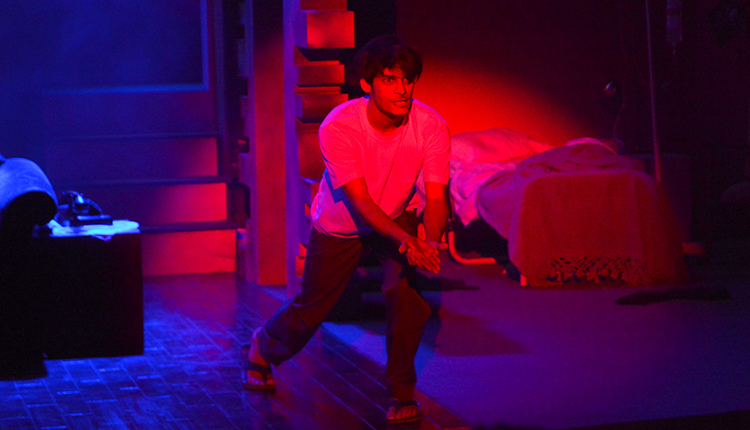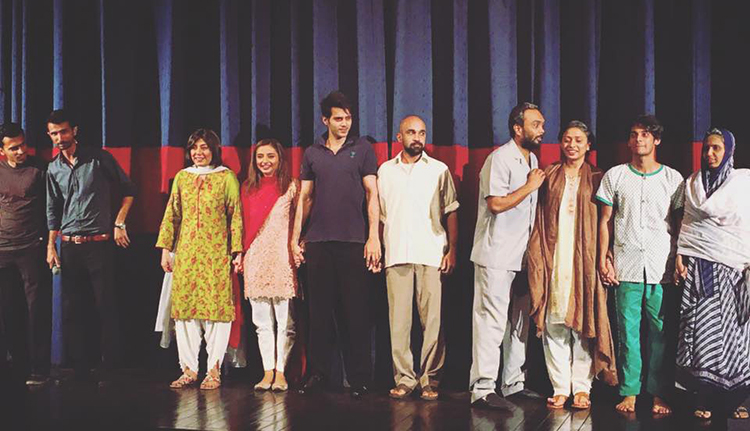Written by: Hania Masood
Posted on: April 29, 2016 | 
The Rizvi family united in Gulzar's sickness (images provided by Chromium Media Studio)
“The anguish of the mind needs to be heard. So let’s start listening.”
In a country where the topic of mental illness is marred with stories of jinn possession and nazar, this play is a genuine insight into the life of a middle-class family, distraught by the mental instability of their only son, Gulzar (played by Hadi bin Arshad).

Suno! starts off with a mysterious death in the Rizvi household: the patriarch of the family, Asghar Rizvi, has passed away, leaving his only grandchild, Gulzar, in a state of turmoil. Prior to his grandfather’s death, Gulzar is shown to be a lighthearted, straight-A student who is the pride of his parents, Afia and Sohail (played by Syeda Danya Zaidi and Hammad Siddiq, respectively).
However, from the very beginning, the play establishes a change in Gulzar’s personality, portrayed by the textbook symptoms of someone who is afflicted with bipolar disorder. He feels isolated due to the growing distance between his parents and himself; the father resorts to harsh and violent behavior when he feels that Gulzar is acting out, and his mother dismisses his behavior, blaming it on the pressure of exams. Gulzar refuses to spend time with his close friends Sophiya and Murtaza (played by Yasmin Hashmi and Hasan Khan), fails his exams, and displays constant mood swings. The only person willing to accept his mental disability is his grandmother (played by Mahjabeen Rahman), who has dealt with these symptoms with her husband before he took his own life. However, when she suggests that Gulzar needs therapy, she is met with severe criticism by Sohail, who would rather believe that his son is possessed than send him to a mental healthcare facility.
Gulzar’s isolation and his inability to comprehend his illness lead him to attempt suicide, which finally forces his parents to realize that he needs professional help. The idea that anyone who needs therapy is “crazy” is unfortunately embedded deep within our mindsets, which is very aptly characterized by the role of the father. The offhand use of words such as ‘paagal’ (mad) depicts the insensitive nature of our society through the meticulously written script, with Gulzar’s predicament striking a chord with people who are affected by mental illnesses but choose not to seek therapy due to the taboos surrounding the subject.

The concept of approaching ‘hakims’ and ‘ustaads’ instead of seeking professional help is also a common occurrence in our society, with mental disorders not being recognized as a real illness by a large majority of people. Such an episode was depicted in this play, with Sohail coming under the influence of others and resorting to such cures. Furthermore, the play managed to accurately show the troubles faced by a household, who are equally engulfed in a battle to justify their decision to admit their son in a mental healthcare facility. This was effectively portrayed through the characters of Shehla (played by Hiraa Dar) and her husband Ahsan (played by Syed Jameel), who also provided some comic relief in an otherwise serious play. Speaking to Assistant Director Amtul Baweja about the serious undertones of the play, she remarked that the team knew they had to tackle this taboo head-on; beating about the bush would not have achieved the purpose of spreading awareness among the audience.
While the play ends on a somewhat abrupt note, it achieves what it had set out to: it forces the audience to see mental disabilities for what they are, rather than sweeping them under the rug due to social stigma. Suno! is a much-needed effort in the theatrical arena to address the often-hushed issue of mental illness and raise awareness about the appropriate treatment options for people affected by mental disorders.
All images have been provided by Chromium Media Studio.
You may also like: